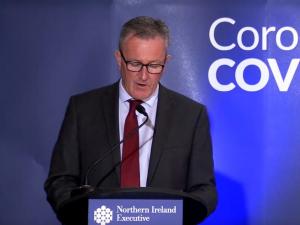
By Michael McHugh, PA
Critics who expect Stormont powersharing to work without dispute are naive, the finance minister said.
Differences between the DUP and Sinn Fein over testing for coronavirus were aired in the Assembly on Tuesday.
Sinn Fein has consistently pressed for more widespread checks over many weeks, and criticised the decision to halt most contact tracing earlier in the pandemic.
Efforts are being ramped up at present after the peak of infection passed, and Conor Murphy said the shared aim of ministers in Northern Ireland was to save lives and livelihoods.
He said: "Our arguments in the executive over this have been about policy matters."
He said they involved huge challenges which nobody had envisaged the executive would have to face when they restored powersharing in January.
"To expect that a five-party coalition would embrace these issues without any disputes amongst us was probably naive.
"I have a very strong working relationship with Robin."
He addressed a joint news conference with health minister Robin Swann on Tuesday at Stormont.
Earlier in the pandemic, Sinn Fein's deputy first minister Michelle O'Neill criticised Mr Swann for being too slow to begin testing.
They also aired differences over support being provided by the British Army.
Mr Murphy said: "We were in a significantly challenging political atmosphere with the ongoing effects of austerity, with Brexit, with the five-party coalition, with the shortened timeframe in terms of getting matters resolved - all those challenges faced us and this pandemic came along."
Mr Murphy said he had worked closely with the health minister on managing their response to the crisis.
"Our shared priority is to protect lives and livelihoods."
He blamed Tory austerity for helping to run down the health service and said future implications would be very challenging.
"I hope it prompts a rethinking in London and Dublin."
He maintained there was an excellent level of co-operation across the Irish border but said clarity was key.
Mr Swann repeated his message that the NHS was in need of radical transformation and needed extra funding to do so.
He said health trusts had been asked to begin rebuilding services to cater for non-Covid-19 care.
For the foreseeable future it would be akin to running two health services alongside each other.
The minister added: "There can be no return to the way we were in December 2019."
Instead, he said, they should embrace innovative practices shown during the pandemic, like telephone consultation.
"We need to set our sights higher than a return to the old status quo, rebuilding gives us an opportunity."
He published a mental health action plan on Tuesday featuring "comprehensive" funding.
It included specialist perinatal mental health services, the development of managed care networks for child and adolescent mental health services and forensic mental health services.
There will be further support given to primary care in the community.
The initiative includes a dedicated Covid-19 plan which outlines the psychological wellbeing and mental health response.
The minister added: "The importance of this has been brought into sharp focus during these unprecedented times, when the mental health of the population is suffering as a result of the devastating impact of Covid-19."


 Belfast’s first ever Cocktail Week brings ten days of drinks, food and fun this November
Belfast’s first ever Cocktail Week brings ten days of drinks, food and fun this November
 Q Radio announced as the new Official Radio Partner of the 2026 Phoenix Energy Belfast City Marathon
Q Radio announced as the new Official Radio Partner of the 2026 Phoenix Energy Belfast City Marathon
 Arson attack on house while children slept inside
Arson attack on house while children slept inside
 Baby threatened with broken glass during Belfast carjacking
Baby threatened with broken glass during Belfast carjacking
 Veteran Soldier F not guilty of murders on Bloody Sunday
Veteran Soldier F not guilty of murders on Bloody Sunday